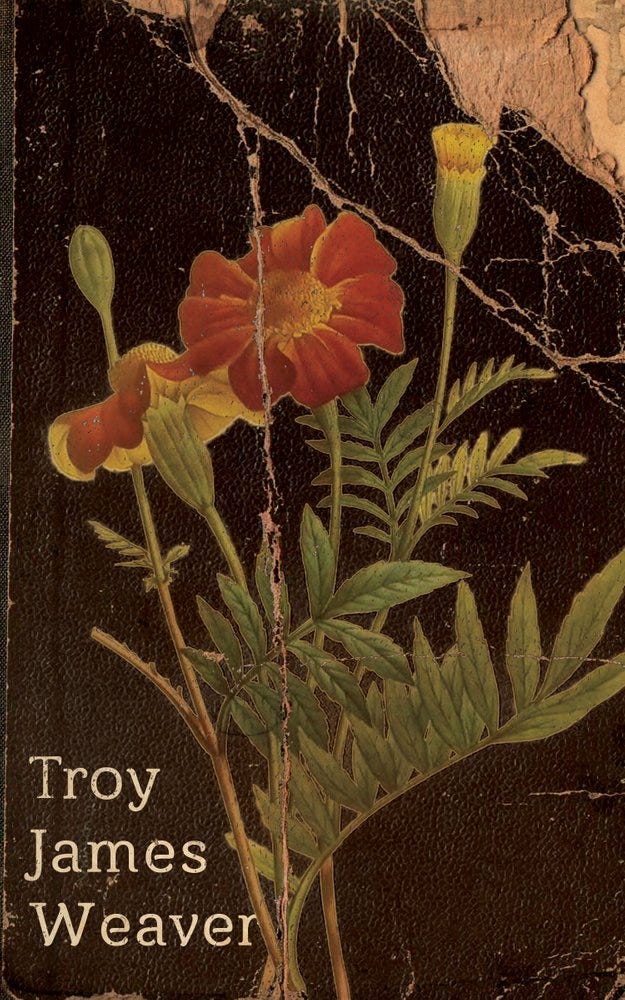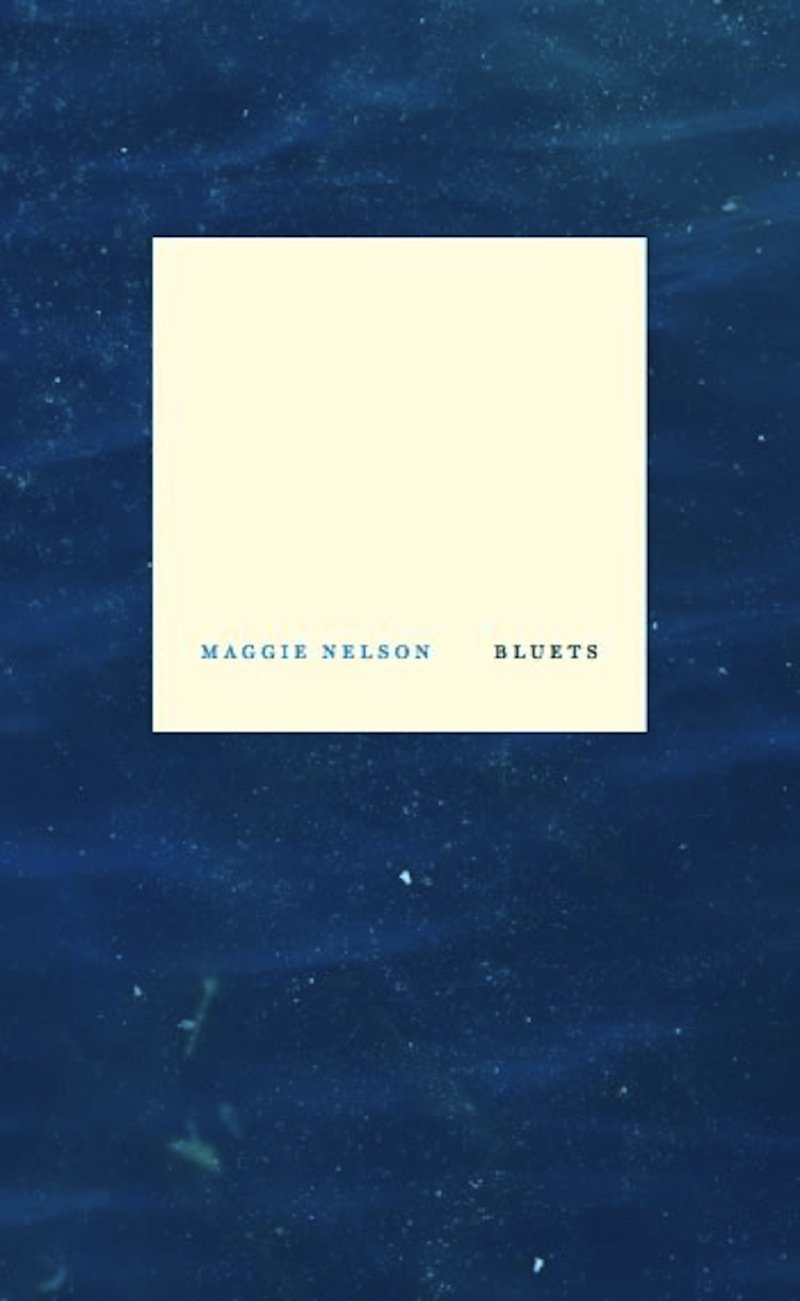Not Trying Has Become The Whole Plan
Marigold
Author: Troy James Weaver
Released: March 11, 2016
Publisher: King Shot Press
Bluets
Author: Maggie Nelson
Released: October 1, 2009
Publisher: Wave Books
I read two books in April. The reasons- I needed something shorter than the tomes I’ve been reading all year. I wanted to go to my shelves and find books I bought ages ago but have yet to read. And when I couldn’t decide on Marigold or Bluets I figured I’d read both and pick the one I liked better to write about.
But after I finished Marigold and was halfway through Bluets it was obvious they weaved so well together. So here we are, and here’s the playlist I created for both.
Maggie Nelson talks about how the process of composing everything as though it’s a letter makes her feel less alone. ‘I would even go so far to say that I do not know how to compose otherwise, which makes writing in a prism of solitude, as I am here, a somewhat novel and painful experiment.’
Troy James Weaver’s somewhat novel and painful experiment, Marigold, is a suicide note. It’s a haunting 113 page paperback with a short vignette on each page that contains ruminations on loneliness, alienation, memory and suffering. But the writing is not begging for attention, there’s no indulgence or navel gazing. Reading the pages feels more like reading the narrator’s mind.
The narrator, a nameless young man who works at a flower shop, goes about his days. He lives with his wife, interacts with customers and coworkers, and he calls the suicide prevention hotline frequently. He calls the suicide prevention hotline because he doesn’t want to be alive anymore, to live this life of his, but he has not lost hope fully to the point of ending it.
Reading this short story was like stepping into a time machine. On the first page, the first thing we learn is that the narrator is depressed by waking up.
I can remember another lifetime of mine, about a decade ago, when those first thing in the morning feelings of dread, waking up alive, feeling heavy and miserable and full of tears that came once my eyes start blinking, feeling like I’d go on living my life if there was a reason to, but there wasn’t, so, thinking about my death was how I inevitably spent the day.
My memory has been blurry for a little while when I look back, trying to decipher how long I considered suicide to be my only option, and I sum it up to be a three year time period, roughly 2008-2010. I was mostly unemployed during that time period, and I had run out of options for getting my shit together, and I’d also run out of excuses as to why I couldn’t get my shit together.
Marigold pulled me in immediately. Never mind that the story is short, the format is sympathetic in the sense that it’s easy to read page after page in one sitting, but as a woman who has been through my own agonizing bouts of depression, I was searching for clues and an explanation in this story’s pages. What brought him to this point.
‘The feeling gets stronger every year, from way back to the time I struck out in Tee Ball. I was eight years old. Now and again there’s a swirling about me, a forming, like clouds, and I go back to that swing, that miss, the humiliation— both sad and glad my father never made it to a single game.’
Prior to the dark period in my life, I’d spent a few years working in the mall. I was in my late twenties, stuck in a retail loop that barely paid my bills. I had no ambition to work any harder. I relied on my family’s financial support, housing support. I didn’t have many friends, either. The girls I worked with during my shifts in the store were the only socializing I experienced. It was the entirety of my world. I think some of them grew to like me, and actual bonds formed, but I was too fucked up to be a real friend to anybody. I didn’t really know that though. I just knew that the world in front of me felt like it was wrapped in cellophane. I could see it, I could touch it, but nothing seemed like it could be mine.
Marigold has a similar quality. As the short story unfolds on the small pages, a portrait of a life is painted about a man’s bleak existence. There’s hints about sick family, memories of childhood, siblings, girls, parties, secret sex, glimpses of joy during intoxication, and childhood freedom and no responsibilities. But the shift into adulthood and the dread that surrounds the narrator also hints that somewhere along the way, he shifted permanently off course, and getting back on isn’t possible. Was he ever even on course to begin with.
Reading both Marigold and Bluets together has been such an incredible reminder to me that no feeling lasts forever. In 2009 and 2010 I couldn’t fathom the feelings of having to die would end. Now I can’t imagine those feelings ever returning. And if they ever do, I believe I would forget that it’s possible they could someday vanish.
Chelsea Hodson has a quote in her essay When I Turn (located in her amazing collection Tonight I’m Someone Else) that says:
I started to think the pain would last forever. Even then, I accepted my life. ‘It will just be sad from now on’ I thought. This was the new way. I was so lonely I began regarding my broken heart as the most beautiful thing in my life. Soon after that, it was gone, too.
Another reminder: feelings aren’t facts. This is a concept I fought very hard to resist admitting was true. I remember when I first heard it, from a woman I barely knew and did not like, after I shared something painful that I was feeling. Feelings aren’t facts. My response was go fuck yourself. The way I felt surrounded me constantly, like the weather, there was no possible way I could admit they weren’t my facts.
As I dug deeper I started to think about what a fact is and is not: dolphins are mammals (fact) my birthday is November 17th (fact) I will never truly forgive B. (feeling) I really need Botox (fact?) I really want to go on vacation (feeling).
I bought Bluets in 2015. I tried to read it at least three times before this past month, and couldn’t get through it. It always felt like something, as a writer, I was supposed to read. Excerpts of it were shared as prompts in workshops I took, it was suggested to me by writers I admire, it’s got literary acclaim, it’s a book writers love, it’s lauded, highly praised, exceptional, experimental, heady. My brother and his wife (hi Simona!) gave it to me when I graduated college, my second copy.
I had always felt too sad whenever I started to read it, but this time, April, I got through it in a week, I must have finally been in the right head space. Finally happy enough to read such a stark, lonely, isolating book.
Bluets is this one of the most brilliant lyrical prose pieces I have ever read. It’s a scorching exploration of grief, suffering and the shape-shifting effects of love, told through the lens of an obsession with the color blue.
It’s also a meditation on what happens after someone you love goes away. Which is something most people have experienced in some form or another, probably more than once depending on how old you are. I started to feel this loss at a young age, it began in sixth grade when a best friend moved across the country, and my remaining friends seemed to stop liking me. Then in middle school, a first boyfriend broke my heart, followed by a second boyfriend.
Blue is something universal, it belong to all of us. So does heartache.
This book starts out exploring the color blue, and then slowly the person who left her (the Prince of Blue) is revealed. Passages are written about a friend who is in an accident, left paralyzed. Degrees of pain are described.
I started to feel connected to this book about halfway through it. I turned a page and saw this passage, underlined, from a previous attempt at trying to read Bluets:
“It often happens that we count our days, as if the act of measurement made us some kind of promise. But really this is like hoisting a harness onto an invisible horse. "There is simply no way that a year from now you're going to feel the way you feel today," a different therapist said to me last year at this time. But though I have learned to act as if I feel differently, the truth is that my feelings haven't really changed.
I was struck with a memory of the person whose absence in my life caused me to underline that passage, someone from a few years ago who I have not spoken to in some time, and the grieving process had been extended and painful, mainly because I felt tremendous guilt for leaving that person. I couldn’t imagine the sadness I felt leaving me, and now, it’s gone. I was so pained over how terrible I felt, I couldn’t wait to move past it. But once I did, the majority of the tenderness I’d once felt was also impossible to locate. To move from from love, to pain, and eventually neutrality is almost offensive.
“For to wish to forget how much you loved someone—and then, to actually forget—can feel, at times, like the slaughter of a beautiful bird who chose, by nothing short of grace, to make a habitat of your heart.”
I found myself crying as I read the last two pages, Maggie Nelson’s farewell and reckoning to her sadness, the end of her love story with blue. There are so many similarities between Bluets and Weaver’s Marigold; they’re both urgent, fragmented, enlightening.
I tried to read Bluets so many times because I could never pick up where I left off, I kept starting over, reading the passages on acute loneliness as a means to feel less alone. Repeatedly in the book, Maggie Nelson affirms she never chose to fall in love with blue, it chose her. Nelson’s Bluets reminds me I never made a choice any time I fell in love just like Marigold reminds me I never made the choice to kill myself. Obsessive love and constant loneliness both had a specific way of suddenly taking over my life, without my consent, so much so I don’t know what feeling is more intense.
The heartache and sadness is these books offer hope that these feelings do not have to endure, they change shape, the volume gets lower, these feelings pass and evolve, just like they did for me.
I can’t help but feel some relief, an almost amnesia, that I forget what those creatures ever did to me. I hope I forget for as long as I can until one sudden day, inevitably, they’ll both return to me.
Thank you for reading, please subscribe below:
picture credit:
Claus Bergen, Lonely Sea, 1930




